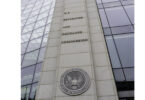Today the Libra Association which will oversee the Libra digital currency and payments system, appointed its first CEO. Stuart Levey, who is currently Chief Legal Officer at HSBC Holdings, comes with a strong compliance track record. However, HSBC’s record in this area is not that glowing (more on that later). Last month, Libra formally commenced its licensing process with Swiss regulator FINMA and published an updated whitepaper that sought to appease regulators.
Harvard graduate Levey spent more than ten years in U.S. government departments, including more than seven years as Under Secretary of the Treasury for Terrorism and Financial Intelligence during the Bush and Obama Administrations. He will join Libra later this summer.
“Technology provides us with the opportunity to make it easier for individuals and businesses to send and receive money, and to empower more than a billion people who have been left on the sidelines of the financial system, all with robust controls to detect and deter illicit financial activity,” said Mr. Levey. “I look forward to working closely with governments, regulators, and all of our stakeholders to realize this vision.”
There are parallels to Levey’s hiring by HSBC and Libra. Regulators around the world have major concerns about how to regulate what could be a supranational digital currency. Compliance is a major issue, but there are perhaps bigger concerns about Libra’s threat to sovereignty and financial stability. So numerous regulator reservations need to be met for Libra to ever see the light of day.
Levey was hired at HSBC to address the fall out after HSBC was found to have laundered money for the Mexican drug cartel to the tune of $881 million. The firm was fined $1.9 billion as a result.
But rolling out compliance checks has not always been smooth at HSBC. It introduced its Safeguard program for small businesses in the UK, which essentially is a know your customer (KYC) program. The ramp-up in 2017 was clumsy at best.
To encourage clients to go through the process, the bank set deadlines for the KYC checks, and if they were not conducted in time, bank accounts would be frozen. However, the new department was understaffed, training was poor and the rollout was badly managed.
Despite going through an hour of KYC checks on the phone, small businesses had their accounts frozen for months because more senior colleagues spent months reviewing the process and didn’t meet the deadline. Furthermore, the businesses were unable to communicate with the HSBC department.
Right now, these sorts of operational hiccups might appear to be a nice problem to have for Libra. Because Libra still has a long way to go before it can appease regulators.






